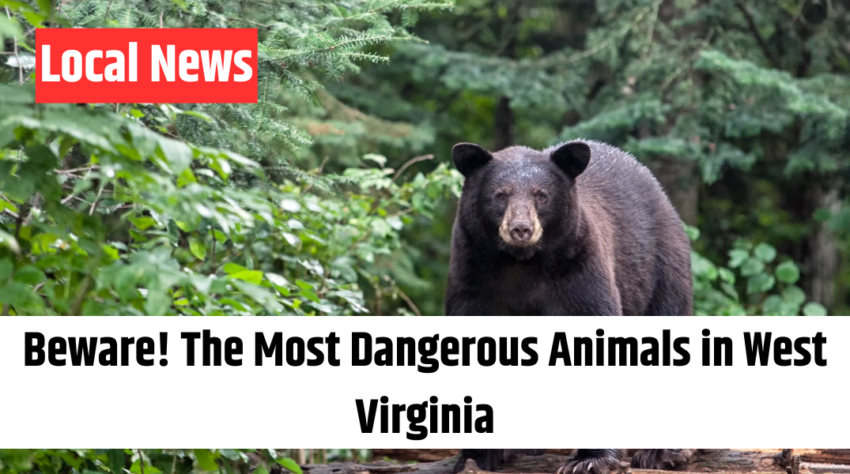West Virginia’s lush forests and rolling mountains are home to a diverse array of wildlife, offering breathtaking encounters with nature. While most animals prefer to steer clear of humans, some can pose risks if startled or provoked. Whether you’re an avid hiker, camper, or just enjoy exploring the outdoors, knowing which creatures to watch out for can help you stay safe. Here’s a look at some of West Virginia’s most dangerous animals and how to avoid trouble.
1. Eastern Timber Rattlesnake
Recognized as the state’s official reptile, the Eastern Timber Rattlesnake is both an important part of the ecosystem and one of its most dangerous inhabitants. Its venom contains powerful toxins that can lead to severe pain, swelling, and even tissue damage. Although rattlesnakes typically avoid people, they will strike if they feel threatened.
How to Stay Safe: Stick to established trails, wear sturdy boots, and always watch where you step. Avoid reaching into logs or brush where snakes might be hiding. If bitten, seek medical attention immediately.
2. Black Bear
Black bears are the largest predators in West Virginia, and while they generally avoid humans, they can become aggressive—especially when protecting their cubs or if they associate humans with food. Encounters are more likely near campsites, trash bins, or areas with unsecured food.
How to Stay Safe: Store food securely, use bear-proof containers, and never approach a bear. If you encounter one, remain calm, speak in a firm voice, and slowly back away. Never turn your back or run, as this could trigger a chase.
3. Copperhead Snake
Copperheads are venomous pit vipers known for their ability to blend into leaf litter and wooded areas. While their bites are rarely fatal, they cause extreme pain, swelling, and potential complications if left untreated.
How to Stay Safe: Stick to marked trails, avoid stepping into tall grass or brush, and be cautious when moving rocks or firewood. If bitten, seek immediate medical attention.
Also Read – Public Service Commission Probes Waste Management Operations
4. Striped Skunk
Though not typically thought of as dangerous, skunks pose a serious health risk due to their potential to carry rabies. A bite or scratch from a rabid skunk can lead to severe illness.
How to Stay Safe: Keep garbage secured and never attempt to handle or feed a skunk. If you notice one acting unusually aggressive or disoriented, contact local wildlife authorities.
5. Eastern Black Widow Spider
Black widow spiders are among the most venomous in North America. They prefer dark, sheltered spaces such as woodpiles, sheds, and basements. Their venom can cause muscle cramps, nausea, and severe pain. While deaths are rare, bites require medical attention.
How to Stay Safe: Always wear gloves when handling firewood, inspect areas before reaching inside, and shake out shoes or clothing that has been stored in dark places.
6. Bobcat
Bobcats are stealthy, solitary predators that typically avoid humans. However, if they feel cornered or are protecting their young, they can become aggressive. With sharp claws and powerful jaws, they can inflict serious injuries if they attack.
How to Stay Safe: If you spot a bobcat, make yourself appear larger, make noise, and slowly back away. Avoid turning your back or running.
7. Coyote
Coyotes are highly adaptable and can be found in both rural and suburban areas of West Virginia. While attacks on humans are rare, they may become aggressive if food is scarce or if they feel threatened. Pets, particularly small dogs and cats, are at risk.
How to Stay Safe: Keep pets indoors at night and avoid leaving pet food outside. If you encounter a coyote, make loud noises, wave your arms, and maintain eye contact to deter it from approaching.
Ghosts of the Past: Mountain Lions & Gray Wolves
Though officially considered extinct in West Virginia, occasional reports suggest that mountain lions and gray wolves may still roam remote areas. Whether real or imagined, these stories remind us of the once-thriving predators that shaped the region’s ecosystem.
Enjoy the Wild, Stay Safe
West Virginia’s natural beauty is unmatched, but being aware of the potential dangers allows for a safer experience. By respecting wildlife, staying alert, and following precautions, you can explore the great outdoors with confidence—without an unwanted close encounter .
